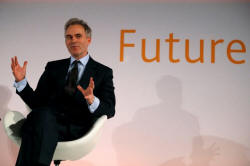Who will lead Britain's central bank after Brexit?
 Send a link to a friend
Send a link to a friend
 [January 09, 2018]
By William Schomberg [January 09, 2018]
By William Schomberg
LONDON (Reuters) - Britain is expected to
choose a new central bank chief this year to succeed Canadian Mark
Carney, who will step down in June 2019, three months after the
country's scheduled exit from the European Union.
Following is a summary of possible contenders to run the Bank of England
(BoE), which oversees the world's sixth-biggest economy and Britain's
huge finance industry. No one has yet thrown their hat into the ring.
ANDREW BAILEY - the outsider insider
Widely tipped by analysts as Carney's most likely successor, Bailey
reached the role of deputy governor of the BoE with a focus on banks
before becoming chief executive of the Financial Conduct Authority, a
financial markets regulator.
During his time at the BoE, Bailey helped to steer Britain's banks
through the global financial crisis, enhancing his reputation as a safe
pair of hands.
However, heading the FCA - which roots out misconduct in Britain's large
financial services sector - is fraught with risks. The head of the
British parliament's influential Treasury Committee has criticized
Bailey for withholding parts of a report into alleged misconduct by
state-owned RBS during the financial crisis. Bailey has cited privacy
restrictions.

As FCA boss, Bailey sits on important panels at the BoE that oversee
banks. Although he has never been interest-rate setter, he once ran the
BoE international economic analysis team.
Bailey acknowledged the speculation about a move to the BoE in an
interview published this week. "Youíll be unsurprised to know this
question comes up reasonably often," Bailey told Financial News. "But
Iíve got a job and, I have to be honest with you, I have never spent my
time thinking about the one I want to do next."
BEN BROADBENT AND DAVE RAMSDEN - the deputies
Broadbent and Ramsden are deputy governors for monetary policy and for
markets and banking respectively, burnishing their credentials as
potential successors to Carney.
Broadbent, a former Goldman Sachs economist who once trained as a
classical pianist, is respected for his economic analysis but has less
experience on banking oversight, which has become an important part of
the BoE governor's role.
Ramsden only joined the central bank in September although he is no
stranger to the Monetary Policy Committee having attended 92 of its
meetings in his previous role as the Treasury's chief economic advisor.
The two other BoE deputy governors, Jon Cunliffe and Sam Woods, are less
likely contenders. Woods focuses mostly on bank regulation while
Cunliffe - a former British ambassador to the EU - would be aged 66 at
the start of the term which usually runs for eight years, although
Carney has chosen to step down after six.

[to top of second column] |

Bank of England Deputy
Governor Ben Broadbent speaks at the 'Future Forum 2017' event in St
George's Hall, Liverpool, Britain November 16, 2017. REUTERS/Phil
Noble/File Photo

ANDY HALDANE - the free thinker
The BoE's chief economist, Haldane has developed a reputation for
floating unconventional ideas, including the abolition of cash as a way
to give central banks more muscle over the economies they run. In 2012,
he praised the anti-capitalist Occupy movement for suggesting new ways
to fix the shortcomings of global finance. Haldane has experience of
both sides of the Bank, having served previously as executive director
for financial stability, overseeing the risks to the economy from the
banking system. But he might be seen as too much of a maverick to take
the job of governor.
OUTSIDERS?
The announcement of Carney, the first non-British governor of the BoE in
more than three centuries, was a surprise. Should finance minister
Philip Hammond also opt for a less obvious candidate, one name that has
appeared in Britain's media is that of Sharon White, the head of a
telecoms regulator and who previously worked at the Treasury. The
daughter of Jamaican immigrants, she has won wide praise for her
high-profile roles in the public sector. Another outside contender would
be Adair Turner, a former chairman of a now defunct financial services
regulator who was in the running last time around. He continues to speak
about the British economy and has warned of the risks from high debt
levels.
A LABOUR PARTY GOVERNOR?
The prospect of the left-wing Labour Party taking power in the next year
or so is remote but investors are mindful that Prime Minister Theresa
May has only a small majority in parliament after last year's failed
election gamble and her Conservative Party is split over how to leave
the European Union. Labour leader Jeremy Corbyn and his would-be finance
minister John McDonnell are socialists and have in the past proposed
that the BoE should fund investment in infrastructure, a big change from
its current focus on inflation.

If they were to pick the next BoE governor, Ben Seager-Scott, chief
investment strategist at Tilney Group, an investment firm, said they
might consider former members of an economic advisory committee which
included U.S. academic and Nobel Prize winner Joseph Stiglitz and Ann
Pettifor, a British economist who is an austerity critic.
(Additional reporting by Huw Jones and David Milliken; editing by
Philippa Fletcher)
[© 2018 Thomson Reuters. All rights
reserved.] Copyright 2018 Reuters. All rights reserved. This material may not be published,
broadcast, rewritten or redistributed. |